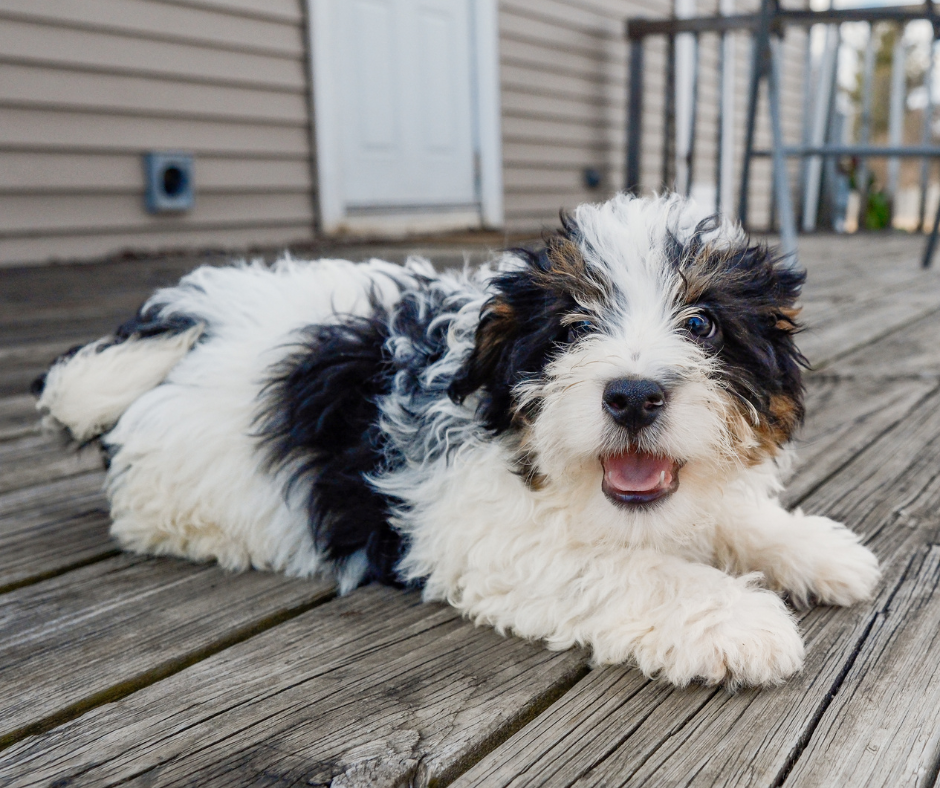
Top 10 Tips for Raising Your Bernedoodle in a Small Apartment
Share
The Bernedoodle, a charming mix between Bernese Mountain Dogs and Poodles, are known for their friendly demeanor, intelligence, and hypoallergenic coat. Despite their larger size compared to other designer breeds, Bernedoodles can thrive in small apartments with the right care and attention.
Raising a Bernedoodle in a small apartment is achievable with dedication and planning. Ensure they get ample exercise through daily walks and indoor play. Create a designated space for them with a cozy bed and toys. Regular grooming and mental stimulation are essential to keep them healthy and happy. Consistent training, a balanced diet, and quality time together will help your Bernedoodle thrive in a compact living environment.
Provide Adequate Exercise for Your Bernedoodle
Ensuring your Bernedoodle gets enough exercise is crucial for their physical and mental well-being, especially in the confines of a small apartment. These intelligent and energetic dogs require regular physical activity to burn off excess energy, maintain a healthy weight, and prevent behavioral issues stemming from boredom. Adequate exercise helps your Bernedoodle stay fit, happy, and well-adjusted, making apartment living more enjoyable for both of you. Here's how you can effectively provide the exercise they need.
Daily Walks and Playtime: Bernedoodles are active dogs that require regular exercise to stay healthy and happy. In a small apartment, it's crucial to ensure they get enough physical activity. Aim for at least 30 to 60 minutes of exercise each day. This can include walks, runs, or play sessions in a nearby park.
Interactive Toys: Invest in interactive toys that challenge your Bernedoodle both mentally and physically. Toys that dispense treats, puzzle toys, and chew toys can keep them entertained and engaged, reducing boredom and destructive behavior.
Indoor Play: When outdoor exercise is not possible due to weather or other constraints, create an indoor play area. Use soft toys, balls, and tunnels to set up a mini agility course. This will help burn off energy and provide mental stimulation.
Create a Comfortable Living Space for Your Bernedoodle
Creating a comfortable living space for your Bernedoodle is essential for their well-being and happiness, particularly in a small apartment. A thoughtfully arranged environment can provide your dog with the security, relaxation, and stimulation they need to thrive. From designating a cozy personal area to minimizing clutter and ensuring a peaceful atmosphere, these steps will help make your apartment a welcoming home for your furry friend. Here's how to set up the perfect living space for your Bernedoodle.
Designate a Personal Space: In a small apartment, it's essential to designate a specific area for your Bernedoodle. This space should include their bed, toys, and water bowl. Having a personal space helps them feel secure and gives them a place to retreat to when they need some quiet time.
Comfortable Bedding: Choose a comfortable, supportive bed for your Bernedoodle. Orthopedic beds are an excellent option, especially for larger dogs, as they provide extra support for their joints.
Minimize Clutter: Keep your apartment tidy and free of clutter. A clean and organized space reduces stress for your dog and makes it easier for them to move around.
Focus on Training and Socialization
Training and socialization are fundamental aspects of raising a well-behaved and happy Bernedoodle, especially in a small apartment. Proper training ensures your dog understands basic commands and behaves appropriately, while socialization helps them become comfortable with different people, environments, and other animals. These practices not only enhance your Bernedoodle's confidence and security but also strengthen the bond between you and your pet. Here’s how to effectively train and socialize your Bernedoodle for a harmonious apartment living experience.
Obedience Training: Start obedience training early to ensure your Bernedoodle is well-behaved and responsive to commands. This is especially important in a small apartment where bad behavior can be more noticeable and disruptive. Teach basic commands such as sit, stay, come, and leave it.
Socialization: Expose your Bernedoodle to different environments, people, and other animals from a young age. Socialization helps them become well-adjusted and less fearful in new situations. Regular visits to dog parks and playdates with other dogs are great ways to achieve this.
Importance of Crate Training: Crate training can be beneficial for both you and your Bernedoodle. It provides them with a safe space and helps with housebreaking. Make the crate comfortable with a soft bed and toys, and never use it as a form of punishment.
Maintain a Consistent Routine
Maintaining a consistent routine is vital for the well-being of your Bernedoodle, particularly in a small apartment setting. Dogs thrive on predictability, and a regular schedule helps them feel secure and reduces anxiety. From feeding times to bathroom breaks and exercise sessions, establishing a routine ensures your Bernedoodle knows what to expect each day, fostering good behavior and overall happiness.
Feeding Schedule: Establish a consistent feeding schedule to regulate your Bernedoodle's digestive system and prevent accidents. Feed them at the same times each day and monitor their portions to maintain a healthy weight.
Bathroom Breaks: Take your Bernedoodle out for bathroom breaks at regular intervals. Puppies may need to go out more frequently, while adult dogs can typically wait longer between breaks. Consistency helps prevent accidents and reinforces housebreaking.
Sleep Schedule: Ensure your Bernedoodle gets enough rest by maintaining a regular sleep schedule. Dogs thrive on routine, and a predictable bedtime helps them feel secure and well-rested.
Learn to Prioritize Grooming Your Bernedoodle
Prioritizing grooming for your Bernedoodle is essential to keeping them healthy, comfortable, and looking their best. With their unique curly or wavy coat, regular grooming prevents matting, reduces shedding, and maintains skin health. Additionally, grooming provides an opportunity to check for any health issues, such as skin infections or parasites. By incorporating consistent grooming practices into your routine, you ensure your Bernedoodle stays happy and hygienic in your small apartment.
Regular Brushing: Bernedoodles have a curly or wavy coat that requires regular brushing to prevent matting and tangling. Aim to brush your dog at least three times a week, and more often if they have a curlier coat.
Bathing: Bathe your Bernedoodle every 4 to 6 weeks or as needed, depending on their activity level and coat condition. Use a gentle dog shampoo and conditioner to keep their skin and coat healthy.
Professional Grooming: Consider professional grooming every 6 to 8 weeks to keep your Bernedoodle looking their best. A groomer can trim their coat, clean their ears, and clip their nails, which are essential for their overall health and hygiene.
Provide Mental Stimulation for Your Bernedoodle
Ensuring your Bernedoodle receives ample mental stimulation is crucial for their overall well-being, especially in the limited space of a small apartment. Bernedoodles are intelligent and curious dogs that need regular mental challenges to prevent boredom and destructive behavior. Engaging their minds with interactive toys, training sessions, and creative play not only keeps them entertained but also strengthens your bond.
Puzzle Toys and Games: Bernedoodles are intelligent dogs that need mental stimulation to prevent boredom and destructive behavior. Puzzle toys and games that challenge their problem-solving skills are excellent choices.
Training Sessions: Incorporate short training sessions into your daily routine. Teach your Bernedoodle new tricks or reinforce existing commands. This not only keeps their mind sharp but also strengthens your bond.
Interactive Play: Engage in interactive play with your Bernedoodle, such as fetch, tug-of-war, or hide-and-seek. These activities provide mental and physical stimulation, keeping them happy and healthy.
Address Separation Anxiety
Addressing separation anxiety is crucial for the well-being of your Bernedoodle, particularly in the confined environment of a small apartment. Separation anxiety can lead to stress, destructive behavior, and emotional distress for your dog when left alone. By implementing strategies to gradually accustom your Bernedoodle to your absence and providing comfort during these times, you can alleviate their anxiety and promote a sense of security.
Gradual Desensitization: Bernedoodles can develop separation anxiety if left alone for long periods. Gradually desensitize them to your absence by leaving them alone for short intervals and gradually increasing the time.
Provide Comfort Items: Leave comfort items such as a favorite toy or a piece of clothing with your scent to help soothe your Bernedoodle when you're not home. These familiar items can provide a sense of security.
Professional Help: If your Bernedoodle's separation anxiety is severe, consider seeking help from a professional dog trainer or behaviorist. They can provide tailored strategies to address the issue.
Be Mindful of Noise Around Your Bernedoodle
Being mindful of noise around your Bernedoodle is essential, especially in a small apartment where sounds can be amplified. Bernedoodles can be sensitive to loud or unfamiliar noises, which may cause stress and anxiety. Creating a calm and quiet environment helps your dog feel secure and comfortable. By managing noise levels and gradually acclimating your Bernedoodle to various sounds, you can ensure a peaceful living space for your furry friend.
Noise Sensitivity: Bernedoodles can be sensitive to loud noises, which can be more noticeable in a small apartment. Minimize exposure to loud sounds by using white noise machines, playing calming music, or providing a quiet, secluded space for your dog.
Socialization to Sounds: Gradually expose your Bernedoodle to various sounds from a young age to help them become accustomed to different noises. This can include household sounds, traffic, and other common urban noises.
Monitor the Health and Nutrition of Your Bernedoodle
Monitoring the health and nutrition of your Bernedoodle is vital to ensure they lead a long, happy, and healthy life, especially in the compact setting of a small apartment. A balanced diet and regular veterinary check-ups are key to preventing health issues and maintaining optimal well-being. By staying attentive to your dog’s nutritional needs and health status, you can provide the best care possible.
Balanced Diet: Feed your Bernedoodle a balanced diet appropriate for their age, size, and activity level. Consult your veterinarian for recommendations on high-quality dog food that meets their nutritional needs.
Regular Vet Visits: Schedule regular veterinary check-ups to monitor your Bernedoodle's health and catch any potential issues early. Keep up with vaccinations, parasite prevention, and dental care.
Watch for Health Issues: Be vigilant for signs of common health issues in Bernedoodles, such as hip dysplasia, elbow dysplasia, and eye problems. Early detection and treatment can prevent serious complications.
Foster a Strong Bond with Your Bernedoodle
Fostering a strong bond with your Bernedoodle is crucial for a harmonious and fulfilling relationship, particularly in a small apartment setting where close interaction is inevitable. A deep connection with your dog enhances trust, improves behavior, and enriches both your lives. Through quality time, positive reinforcement, and consistent communication, you can build a lasting and loving relationship.
Spend Quality Time: Spend quality time with your Bernedoodle every day. This can include cuddling, playing, or simply relaxing together. Building a strong bond enhances your dog's sense of security and well-being.
Positive Reinforcement: Use positive reinforcement to encourage good behavior. Reward your Bernedoodle with treats, praise, and affection when they follow commands or exhibit desirable behavior. This strengthens your bond and encourages continued good behavior.
Consistent Communication: Communicate consistently with your Bernedoodle using clear commands and signals. Dogs thrive on predictability and understanding what is expected of them. Consistent communication fosters trust and a stronger bond.
Raising a Bernedoodle in a small apartment is entirely possible with the right strategies and commitment. By providing adequate exercise, creating a comfortable living space, focusing on training and socialization, maintaining a consistent routine, prioritizing grooming, ensuring mental stimulation, addressing separation anxiety, being mindful of noise, monitoring health and nutrition, and fostering a strong bond, you can ensure your Bernedoodle leads a happy, healthy, and fulfilling life. Remember, the key to successful apartment living with a Bernedoodle is dedication, patience, and love.
